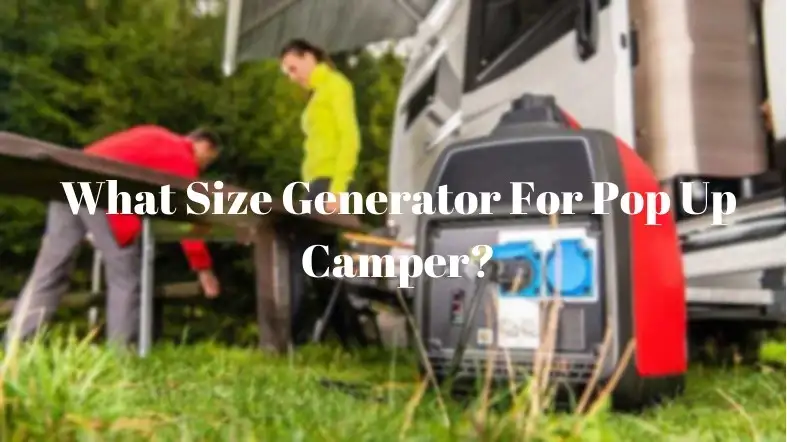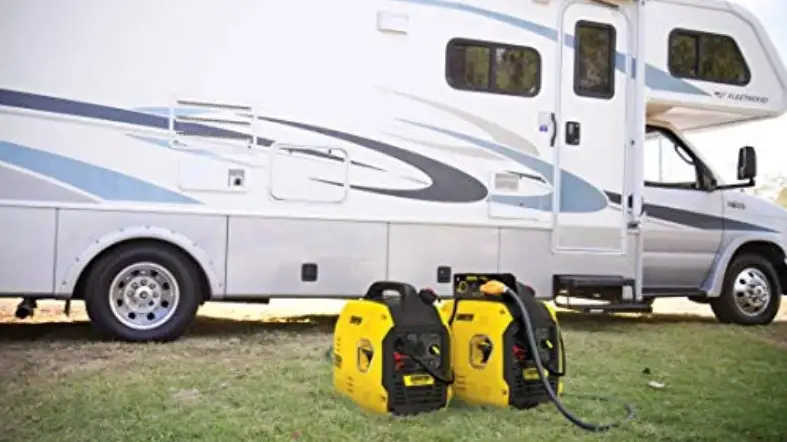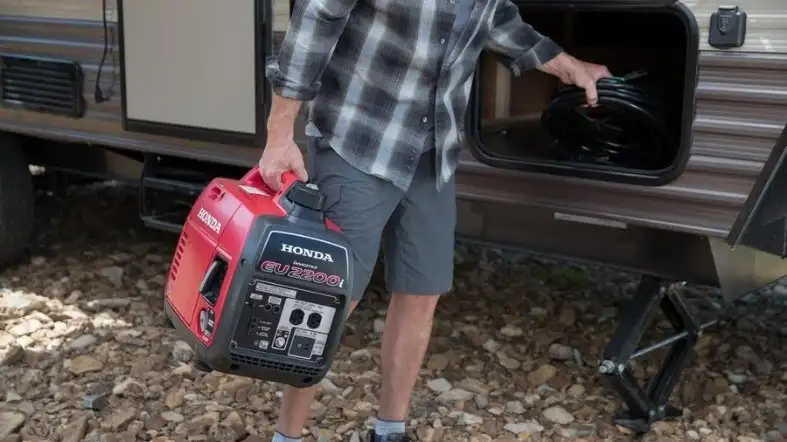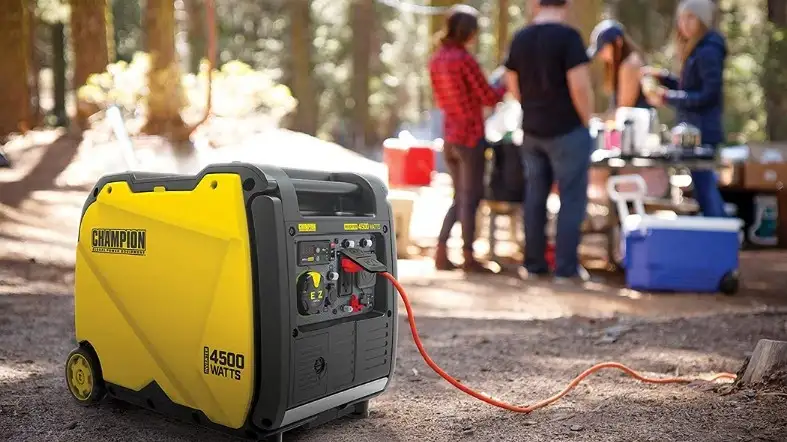Looking to power your adventures with a pop-up camper generator, but unsure about the right size? You’re not alone.
We break down the wattage, features, and types of generators suited for your camping needs. Experience outdoor adventures like never before.

Click Here To Check Recommended Generators
What Size Generator For Pop Up Camper?
For a pop-up camper, a generator providing between 2000 to 4000 watts is generally ideal. It depends on the total power consumption of your appliances and devices. Add a 20% buffer to cover unexpected power surges and the highest starting watts.
Here is the approximate power range, fuel type, noise level, weight, and price of each type of generator.
| Type of Generator | Wattage Range | Fuel Type | Noise Level | Weight | Price |
|---|---|---|---|---|---|
| Solar-Powered | 500-2000 | Sunlight | Very Quiet | Light | High |
| Gas-Powered | 1000-5000 | Gasoline | Moderate | Heavy | Low |
| Battery-Powered | 500-2000 | Battery | Very Quiet | Light | High |
| Inverter | 1000-4500 | Gasoline | Quiet | Medium | Medium |
[CP_CALCULATED_FIELDS id=”10″]
***All wattages are estimates. Your actual device wattage may vary.
[ Always remember you need to buy a generator that is 1000-3000 watts more than your total running wattage. Because the starting wattage of each appliance is more than the running wattage. ]
How to Calculate the Power Needs for Your Pop Up Camper
Here are some steps that you can follow to do that:
List of Appliances and Their Wattage
The first step is to make a list of all the appliances and devices that you want to use in your pop up camper.
You can use this table as a reference for some common appliances and devices and their approximate wattage:
| Appliance/Device | Wattage |
|---|---|
| Air Conditioner | 1000-2000 |
| Refrigerator | 600-800 |
| Microwave | 600-1000 |
| TV | 100-200 |
| Laptop | 50-100 |
| Fan | 50-100 |
| Light | 10-60 |
Calculate Total Wattage Requirement
The next step is to add up the wattage of all the appliances and devices that you want to use in your pop up camper.
This will give you the total wattage requirement for your pop up camper.
For example, if you want to use an air conditioner (1500 watts), a refrigerator (700 watts), a microwave (800 watts), a TV (150 watts), a laptop (75 watts), a fan (75 watts), and two lights (20 watts each), your total wattage requirement will be:
1500+700+800+150+75+75+20+20=3340 watts

Factor in Starting Watts vs. Running Watts
In general, starting watts are higher than running watts, which are the amount of power that an appliance or device requires when it starts up.
Any appliance or device you use must be compatible with your generator’s starting wattage.
To find out the starting watts of your appliance or device, you can use this formula:
Starting Watts=Running Watts×Surge Factor
When an appliance or device starts up, it needs more power than when it runs normally. The surge factor varies depending on the type of appliance or device.
You can use this table as a reference for some common surge factors:
| Type of Appliance/Device | Surge Factor |
|---|---|
| Resistive Load | 1 |
| Inductive Load | 2-4 |
| Capacitive Load | 2-5 |
Such devices as lights, heaters, and toasters are resistive loads since they do not have motors or moving parts. A resistive load has a surge factor of 1, which means that the starting watts and the running watts are the same.
Fans, pumps, and refrigerators are inductive loads because they have moving parts or motors. Starting watts of an inductive load are 2 to 4 times higher than running watts due to the surge factor.
A capacitive load is an appliance or device that has a capacitor, such as air conditioners, microwaves, or TVs. The starting watts of a capacitive load are 2 to 5 times higher than the running watts.
For example, if you have an air conditioner (1500 watts) that has a capacitive load with a surge factor of 3, the starting watts will be:
1500×3=4500 watts
Do this calculation for every appliance or device you use and determine the highest starting wattage. This will be the peak power demand for your pop up camper.
For example, if you have the following appliances and devices with their respective surge factors:
| Appliance/Device | Running Watts | Surge Factor | Starting Watts |
|---|---|---|---|
| Air Conditioner | 1500 | 3 | 4500 |
| Refrigerator | 700 | 3 | 2100 |
| Microwave | 800 | 3 | 2400 |
| TV | 150 | 2 | 300 |
| Laptop | 75 | 1 | 75 |
| Fan | 75 | 2 | 150 |
| Light | 20 | 1 | 20 |
The highest starting watts will be:
max(4500,2100,2400,300,75,150,20)=4500 watts
Importance of Buffer Wattage
The final step is to add some buffer wattage to your peak power demand.
Your appliances and devices will be protected from unexpected power surges or fluctuations. A good rule of thumb is to add at least 20% more power than you need.
For example, if your peak power demand is 4500 watts, you should add 20% more power, which is:
4500×(1+0.2)=5400 watts
This will be the minimum power output that your generator should have to run your pop up camper safely and comfortably.
>> What generator size to power a furnace?
Considerations for Choosing the Right Size Generator
There are some other factors that you should also consider when choosing a generator. Here are some of them:
>> What generator size for a 50 amp RV?

Fuel Type and Efficiency
Your generator’s fuel type and efficiency will determine how long it can run and how much it costs.
You should choose a fuel type that is available and affordable in your camping area. A generator with a high fuel efficiency rating can produce more power with less fuel.
Generators that use sunlight as fuel are the most eco-friendly and cost-effective. They depend on sunlight and have limited power output.
The most powerful and cheapest generator uses gasoline as fuel and produces high power. They are noisy and produce emissions. They also require regular refueling and maintenance.
As battery-powered generators use batteries as the main power source, they are quiet and portable.
They have limited power capacity and need to be recharged frequently. They are also expensive and have shorter lifespans than other types of generators.
Gasoline inverter generators produce clean and stable power, so they are a quiet and efficient option.
They are more expensive and complex than conventional gas-powered generators. They also have lower power output than conventional gas-powered generators.
Noise Level
Your generator’s noise level will affect your camping experience. Choosing a generator with a low noise level rating means that it produces less noise.
Some camping areas have noise regulations and a fine may apply if you use noisy generators.
Since they have no moving parts or engines, solar and battery-powered generators are the quietest. It produces very little noise, usually less than 50 decibels (dB), like a refrigerator or quiet conversation.
Inverter generators and gas-powered generators are louder, as their engines produce noise. Noise levels can range from 60 to 80 decibels (dB), comparable to vacuum cleaners or lawnmowers.
Portability and Size
Your generator’s portability and size will determine how easy it is to transport and store. Choose a generator that fits your pop up camper and vehicle’s weight and dimensions.
A generator also requires accessories, such as fuel tanks, solar panels, batteries, cables, or wheels.
Since solar or battery-powered generators don’t need engines or fuel, they are compact and portable.
They weigh less than 50 pounds and measure less than 20 inches long, wide, and high.
Generators with engines and fuel tanks are less portable and compact than generators with gasoline.
They weigh over 100 pounds and measure more than 20 inches in length, width, and height.
Emissions and Environmental Impact
You can be more eco-friendly and responsible by reducing the emissions of your generator.
Generators with low emission ratings produce fewer harmful gases or particles when they run. The fuel source and generator disposal should also be considered.
Since they emit no emissions or waste, solar or battery-powered generators are the most eco-friendly. Using renewable energy sources, like sunlight or batteries, reduces environmental impact.
Inverter generators and gas-powered generators produce emissions and waste. Non-renewable energy sources like gasoline or propane have a high environmental impact.
Price and Budget
Choose a generator with a reasonable price tag that matches your budget and expectations. You should also consider the operating costs and the maintenance costs of your generator.
Batteries and solar panels are included in the cost of a solar or battery-powered generator. They have high maintenance costs, such as replacing batteries or repairing solar panels.
With gas-powered and inverter generators, the generator itself and some accessories are cheaper. Their maintenance costs include refueling their gas tanks and changing their oil.
Warranty and Brand Reliability
If you choose a generator, make sure it has a warranty that covers any defects or damages during use. Choosing a generator with a good track record of customer service and support is also important.
Generators and batteries powered by solar power have fewer mechanical parts that can fail. They usually have warranties that last for 2 to 5 years or more.
More mechanical parts can wear out or break on gas-powered generators and inverter generators. They usually have warranties that last for 1 to 3 years or less.
Regulatory and Safety Compliance
Consider noise level, emission level, and fire hazard when choosing a generator for your camping area. Make sure your generator has safety features and certifications that guarantee your safety.
The safety and compliance of solar- and battery-powered generators is generally higher. They also have safety features and certifications that prevent short circuits, overcharging, or overheating.
Gas-powered generators and inverter generators produce noise and emissions that might violate rules. They also have safety features and certifications that prevent fire, explosion, or electrocution.
>> What size generator for 5 ton ac?
Top 5 Quietest generator for pop up camper
One of the most important components of your pop-up camper is a quiet generator.
In order for you and your family to enjoy your camping experience, it’s imperative that you have access to power when needed.
If noise levels are too high, then this will be less likely possible.
There are many different generators on the market today with various features and benefits but few stand out as being one of the best choices because they offer more than just power.
*** One such model is Honda’s EU2200i inverter generator which not only offers up reliable electricity should an emergency happen without having to worry about gasoline or oil maintenance.
It also boasts zero emissions making it ideal even in parks where these types of generators might typically not be allowed so you can keep your camping experience clean and true.
*** Another one of the best choices is the Champion 3500 watt portable generator with a power inverter.
This is a popular choice among campers because it’s lightweight, easy to start, and offers the ability to charge both 12-volt DC and 120/240 volt AC appliances from one unit.
*** Another option for campers wanting an uninterrupted camping experience would be Yamaha EF2000iSDEFMVS Inverter Generator.
It features Smart Power Management which automatically adjusts engine speed based on your load requirements.
So you’ll never have to worry about overloading this machine or being too underpowered when running major household appliances like air conditioners.
While still enjoying all of its conveniences such as push-button electricity starting, an hour meter that resets every time the unit is started up again, and low oil shut-off protection in case the oil gets too low.
*** Another great option is Briggs & Stratton P3000E. Has a 2000 watt peak power and 1000 running watts.
The unit weighs in at 44 pounds, but with the wheels locked it only weighs 33 lbs., making portability an easy task for anyone without back problems.
*** The final option I will recommend is the WEN 56225i Fuel Shut-Off Inverter Generator.
This generator has two engine speeds and a max output of 2000 watts at 120 volts.
It is designed to be lightweight, weighing only 56 pounds when empty so that it can easily be carried from place to place as needed.
Tips for Safely Operating a Generator with a Pop Up Camper
These tips will help you safely operate a generator with a pop-up camper.

>> How big of a generator for 200 amp service?
Proper Ventilation and Carbon Monoxide Risks
Generators should be placed outside your pop-up camper in an open area with sufficient airflow.
You should also keep your generator away from any windows, doors, vents, or flammable materials. Inverter generators and gas-powered generators pose a serious risk of carbon monoxide poisoning.
The combustion of gasoline or propane produces carbon monoxide, a colorless, odorless, tasteless gas. When inhaled in high concentrations, headaches, nausea, vomiting, confusion, and even death can result.
Carbon monoxide detectors are also recommended for pop up campers to alert you to dangerous levels. Your generator’s exhaust system should also be checked regularly to ensure there are no leaks.
>> What size generator for 30 amp trailer?
Grounding the Generator
Ground your generator when you use it by connecting it to a stake or metal rod driven into the ground.
This is to prevent electric shocks or fires that might occur due to static electricity or faulty wiring. Use heavy-duty extension cords that are rated for outdoor use and compatible with your generator.
Avoid plugging in too many appliances or devices at once to avoid overloading your generator.
Keeping the Generator Dry
Another important tip is to keep your generator dry when you use it. This means that you should protect your generator from rain, snow, moisture, or water spills.
This is to prevent electric shocks or fires that might occur due to water damage or corrosion. You should also store your generator in a dry and cool place when you are not using it.
You should also drain the fuel tank and the oil tank of your generator before storing it for a long time.
FAQs on What Size Generator For Pop Up Camper
Will a 2000 watt generator run a pop up camper?
Perhaps, but it won’t be able to power all items inside the camper simultaneously or even close.
Will a 3500 watt generator run a 30 amp camper?
A 3500 watt generator can power a camper with a 30 amp circuit.
Will a 5000 watt generator run a camper?
Yes, 5000 watts is enough power for a camper.
Final Words
Choosing the right size generator for your pop up camper is a rewarding task.
The power needs, fuel type, noise level, portability, emissions, price, warranty, and reliability of your pop-up camper should also be considered.
It will allow you to enjoy your camping experience with comfort and convenience. It will also allow you to explore new places and adventures with your pop up camper.

